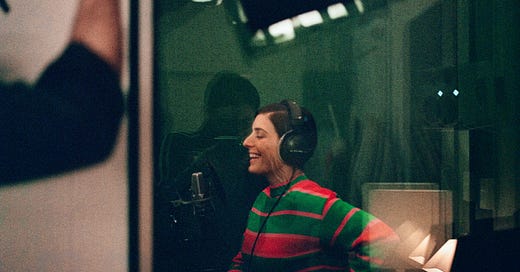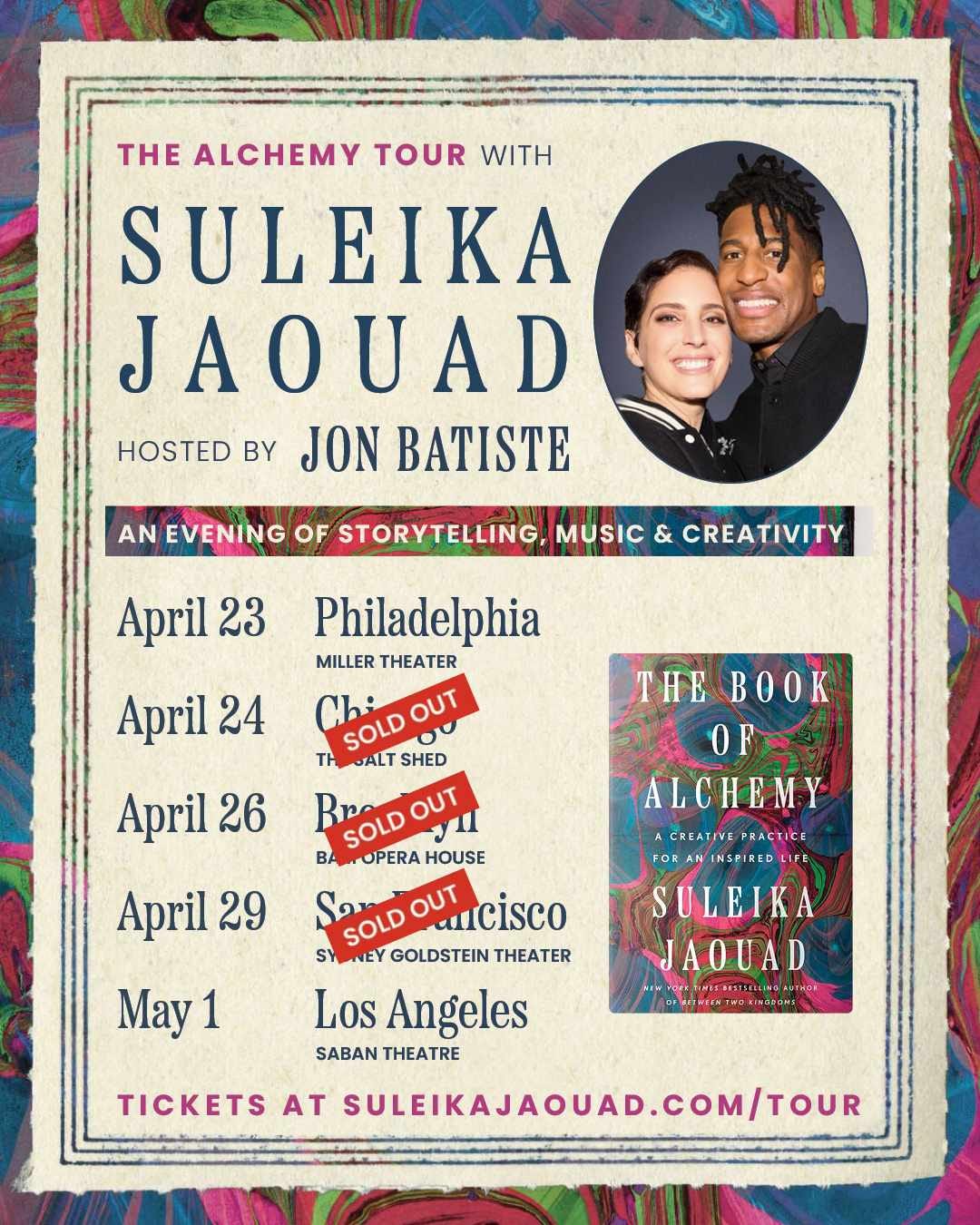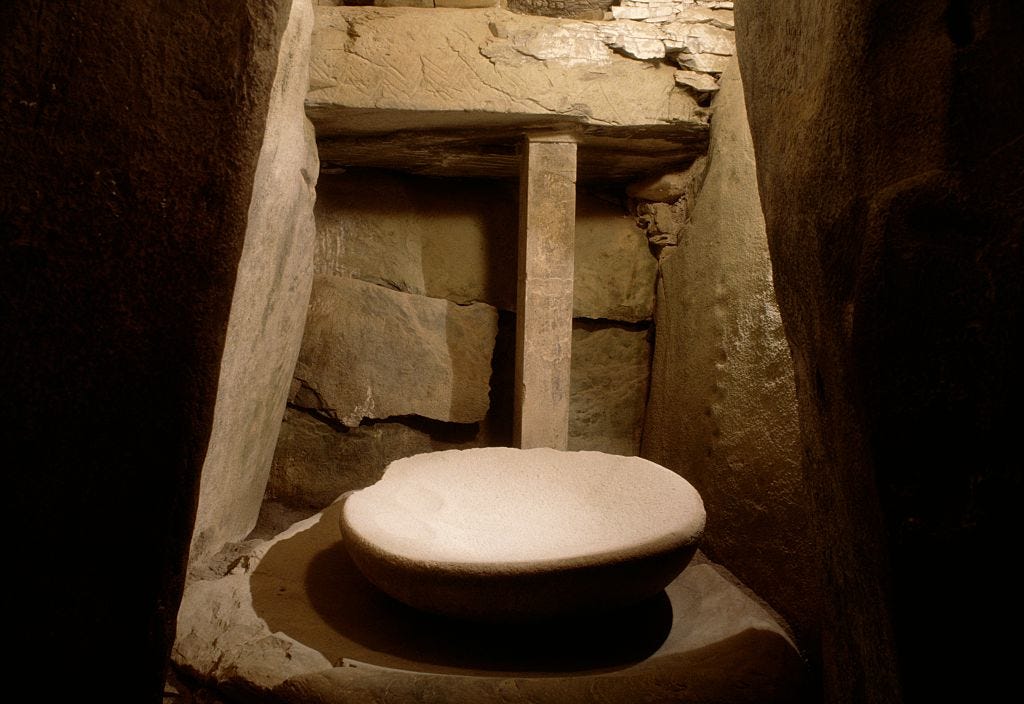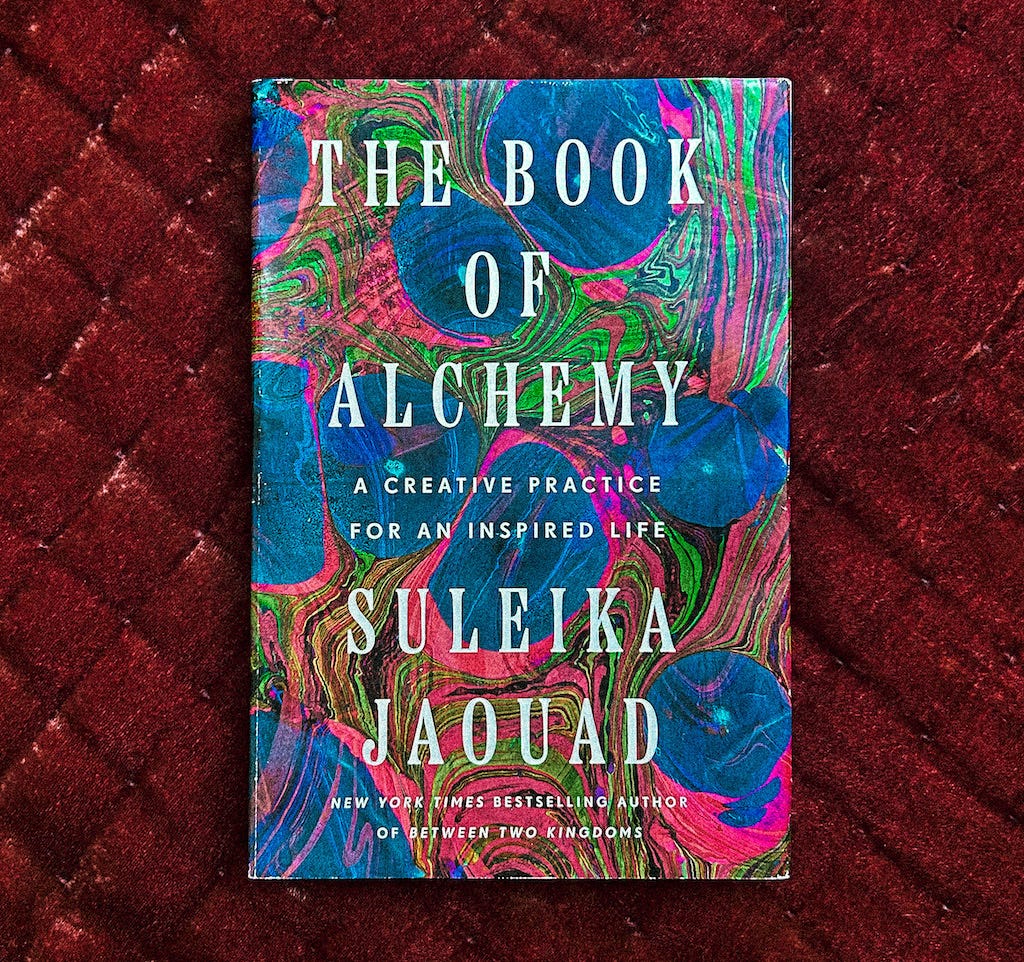Prompt 329. Lessons in Audiobooking & Letting Go
& Carla Fernandez on renegade grief
Hi friend,
I had a moment of déjà vu last weekend, when I was recording the audiobook for The Book of Alchemy. I had been ushered into a little room at a recording studio in Brooklyn, closet-sized, with padded walls and only a desk, headphones, and a mic. I sat down at the desk, and the director and a recording engineer had taken their places in the control room on the other side of a thick plexiglass window, out of view. There, alone with the text, I suddenly flashed back to recording my first book, Between Two Kingdoms. I remembered how terrified I was, how vulnerable I felt, and how unbelievable it seemed that I had actually pulled it off. For years, I didn’t believe I’d finish that book. I feared that I’d be writing it for the rest of my life.
The recording was a little easier this time, but still terrifying, for a number of reasons. First, you have to listen to the sound of your own voice for many hours straight (cue nails on a chalkboard). Second, I never work from a desk, always a couch or a bed. I recorded Between Two Kingdoms at the height of the pandemic, so the studio was a makeshift set-up in the guest bedroom of a friend’s house. I could lie down whenever I needed to then—but not this time. Finally, there was the stress of encountering the text in its final form. Because no matter that you’ve read and revised and proofread your manuscript a thousand times, and no matter how many copy editors have pored over it, things slip through. Your eyes glaze over silly little typos, and only once the book is printed and done do they stand out. Soon into recording, I came across one, and I felt panic. It was a shock to (once again) realize that no matter how hard you work, no matter how much you pour into something, it’s going to bear the imprint of the human hand and mind—which is to say, beautifully, humanly imperfect. Still you have to let it fly the nest, to enter the world.
Perfectionist that I am, that’s difficult for me to accept, and in those first pages of reading for the audiobook, I was in my head. In my anxiety, I was either over-delivering or the opposite, reading robotically as if from a teleprompter. I found myself stopping and starting, every few lines asking, “Can I retake that?” But after half an hour or so, I started to drop in. My voice warmed up, and I began to inhabit the book—not only the narrative, but also the words themselves and even the punctuation. In the first chapter, I quote Virginia Woolf: “How I should like… to write a sentence again! How delightful to feel it form and curve under my fingers.” That’s what it felt like—the sentences formed and curved in my mouth, the words melodic, the punctuation marking time.
And suddenly I realized I had gone several pages where I hadn’t interrupted myself, nor had the director asked me to stop. I had let go and had entered this meditative state, and it felt like a sacred container. I experienced this swell of love for the craft of writing, for the texture of language and the particularities of punctuation. As I progressed, I wondered, How do you convey a comma versus an em-dash with the inflection of your voice? And what intuitive part of the mind reached for a semi-colon here? It made me eager to write again, and it also felt like a beautiful closing ritual. I still have to do the work of helping The Book of Alchemy fly the nest, but the work of the words is done.
Which brings me to today’s prompt contributor—the kind, lovely, and wise Carla Fernandez. Carla and I met when we were on a panel together in LA many years ago, and I loved her instantly. When we met, she told me she was thinking about writing a book about grief, having gone through the particular heartbreak of losing her father when she was twenty-one. (This grief led her to found The Dinner Party, a national network of peer-support circles for young adult grievers.) Over the years, we’ve had many conversations about her book, and all the beautiful stories and wisdom she would weave into it, and I feel such deep joy that she’s done it. Her beauty of a book, Renegade Grief, flew the nest earlier this week, and I’m honored to share an excerpt called “Finding Your Altar” with you today. For a sense of why I love Carla so much, read on.
Sending love,
Suleika
Some Items of Note—
I’m going on a very special book tour to celebrate The Book of Alchemy—and the tickets are going fast. San Francisco, Chicago, and Brooklyn are sold out, and there’s only a handful of tickets left for the Philly show. But there’s still room at the Saban Theatre in Beverly Hills—come see us, Angelenos! You can find more info here!
Our next meeting of the Hatch, our virtual creative hour for paid subscribers, is happening today—that’s Sunday, March 16 from 1-2 pm ET.
will host this time, and she’ll share some powerful letters and reflect on how epistles can turn isolation into creative solitude and connection, even if we never send them. Find everything you need to join us here!
Prompt 329. Finding Your Altar by Carla Fernandez
Picture a grass-covered mound emerging from emerald hills, a temple built into the earth. You spot a doorway in the white stone facade that takes you into a narrow tunnel, eventually pooling into a cross-shaped ceremony space. It’s a place penetrated by a single beam of sun, only at dawn on the winter solstice. Newgrange, north of Dublin, is both an architectural wonder and a burial ground, and has been reminding inhabitants and visitors for millennia to celebrate the presence of light even on our darkest day.
Next, imagine you're in a room of terra-cotta soldiers, protecting the grave of a former emperor, standing vigil for over two thousand years. Or you're standing at the edge of an ocean inlet in western Patagonia at a canoe burial launch site, where dead relatives were sent off in hand-hewn boats to Nomelafken, the Mapuche word for the "Land of the Dead," residing on the other side of the sea.
Across the globe, human beings have consecrated physical places to put our dead, which turn into the places we also get to go with our grief. It's an instinct we can't ignore. We decorate altars. We erect shrines. We design buildings or find places in nature that make us feel the bigness, and the awe, that their life, and their death, has left us with. It's renegade in grief to resist the urge to wipe them from the map, and instead, follow the timeless human urge to make a place where you can find them, even in their absence. Altars can be the places where, when we’re in a kind of grief-induced vertigo, we can sit it out until we're right side up again.
In my grief, I didn't seek out to build an altar, but found myself drawn to a place that over time became that for me. Mine began taking root even before my dad died, in the months preceding his passing. During that time, I would take the stairs three floors up to the roof of our apartment building after he went to bed, bringing along a tote bag of books and journals, colored pencils and watercolors. It was my Mary Poppins sack full of tools that I thought might help tend to the wild array of emotions inside me—sadness and fatigue, adrenaline and anger, sentimentality and the slapstick humor of how shitty this year had become.
Sitting in a folding chair on his roof, I would always orient myself toward the lights of Coit Tower, the memorial for San Francisco's firefighters, a glowing white cylinder on one of the city's tallest hills. To me, as it does to many others, it resembles the nozzle of a fire hose, although that wasn’t the architects’ intent. Over the months of caring for my dad, Coit Tower became my Newgrange, my room of terra-cotta soldiers, or in other words, the physical place where I could deeply honor his life, in the context of his death.
Sitting on the roof, I felt relief when I set my eyes on Coit Tower, unflinching and solid in the midst of so much change. I wished that the fire-hose-looking tower would rain down on my family, to lessen the burning feeling of being with someone as they're dying. Somehow, sitting under the glow of its presence, it did. Under its glow I would unpack my supplies and spend an hour decompressing. Painting or writing bad poems; texting with friends or reading a book; soft gazing at the tower on the hill while my brain caught up with what was happening downstairs in my dad's rented hospital bed.
Those times on the roof, the tower acted as my altar. It was a fixed point, a lighthouse in the distance, from which I could orient and steady myself, exhale and unpack what had happened. I returned to the roof in the weeks after my dad's death, and there I found my center of gravity in the foggy breeze of the city, under a reminder that even in the face of fire we can still find a way to rebuild; and that even in the dark of night, there might still be something bright to lock eyes with on the horizon line.
I no longer live in San Francisco, but whenever I drive into the city on one of its iconic bridges—the amber art deco masterpiece of the Golden Gate, or the twinkly light Bay Bridge—I see the white tower poking up from Telegraph Hill. It always feels like a pang of sadness, but never just that. It also feels like a wink from the version of myself who found in it her altar, and also from my dad, a moment to remember that he is, in this way, still on the map.
Your prompt for the week:
Where are the places you go to honor your person? To find your balance in times of grief? To tie into this timeworn tradition of honoring places where we can honor our past, by locating them in our present?
If you’d like, you can post your response to today’s newsletter and prompt in the comments. As a reminder, we love seeing your work inspired by the Isolation Journals, but to preserve this as a community space, we request no promotion of outside projects.
Today’s Contributor—
Carla Fernandez is the author of Renegade Grief and the cofounder of The Dinner Party, a national network of peer-support circles for young adult grievers, featured in The New York Times, NPR, and Oprah Daily. A senior fellow with USC’s Annenberg School Innovation Lab and a Catherine B. Reynolds Foundation Scholar in Social Entrepreneurship at NYU, Carla works an impact strategist and facilitator, particularly on initiatives related to climate change, democracy, and the arts.
For more paid subscriber benefits, see my advice column, Dear Susu—
Carrying Complicated Grief, where I write to “a conflicted but forever loving mother,” who is grappling with the discovery of her late daughter’s journals, which have compounded an already complicated grief
On Hoarding, Grief, and Asking for What You Need, where I answer a question from a reader who says her whose husband’s capacity for hoarding has reached its “ultimate expression” and who is desperate for change
Cults, Boundaries, & Breaking Ties with Family, where I respond to a community member who grew up in a cult, managed to leave it, but is struggling to heal from losing the people she left behind
Pre-order The Book of Alchemy—
My new book, The Book of Alchemy, comes out on April 22, 2025. I’d be so grateful if you would preorder a copy for yourself or a friend. Preorders are so important for authors, and it would mean everything to me!















After my mother died of glioblastoma, my dad placed the box of her ashes on the shelf above her electric piano. I couldn't look at it. Only around it. It seemed too small a container for her. A few months later, Dad received his own terminal diagnosis: AML. He started treatment, and he began to leave Mom offerings of her favorite infusion snack: Lorna Doones. That's what Mom snacked on during her Avastin drips, so that's what Dad asks for at his sessions. Now dozens of cookie packages sit atop the little wooden box that holds -- but cannot contain -- my mother. A cairn of shortbread for her.
I am so deep in the Bereft these days that I can't tell if I'm swimming or drowning. The water over my head feels the same. Dad is in a clinical trial about an hour and a half from our respective homes. The past month has been filled with only action verbs: teaching, driving, managing, mothering, helping. I am so tired. I keep wishing my mom was here. My bones ache with the missing.
On Friday, I dropped Dad off at the farm after an appointment. As I was leaving, I did my customary chant of "Mom, I miss you. Mom, I miss you." A litany of loss that I tell the farm as I'm leaving. But this time, a voice inside of me said, "Well, why don't you stop talking about it and come see me? You know where I am!"
My mother was the only person I know who had a twinkle in her eye AND her voice. No mistaking who was sassing me right then. So I didn't leave. Instead, I drove the car down the tractor trail to our back field. When I opened the door, early spring rushed in like floodwater.
Thawing mud. A hint of mint. Stubby fingers of green pushing up through tufts of dessicated field grass. The pure, piercing notes of robins and cardinals and red-wing blackbirds puncturing the air. Their voices tumbling over each other in variations of "I'm here. I'm here. It's time." A glorious birdsong madrigal -- silenced when the resident red-tailed hawk flew over them.
My mom's voice reminded me: she's never inside. She's always out here. My dad has his altar of Lorna Doones, and that comforts him. I have the back field and the change of seasons, and that comforts me. I think maybe a shrine is where your grief settles, but also where it lifts somehow. Maybe it's where you can put down some of the loss and pain you carry around with you. (Like a grief storage unit! Mine has air conditioning! No protection from the elements, but the rent is cheap!) I don't know how the mechanism works. I just felt tightness in my soul ease. Not totally -- but enough so I could keep on with the Doing. And I'm grateful for that.
Grief is an individual journey. My mother passed peacefully in my home 4 years ago. She was 93. I miss her terribly, but I see her almost daily, wherever I may roam. Mom loved to fly, and when she saw a contrail she’d say “look Jane, where are we going today?” Today I’m on a train in Italy, and sure enough, out my window is a contrail, and my heart flutters as I quietly say ‘Hi Mom, I see you!’ 💞